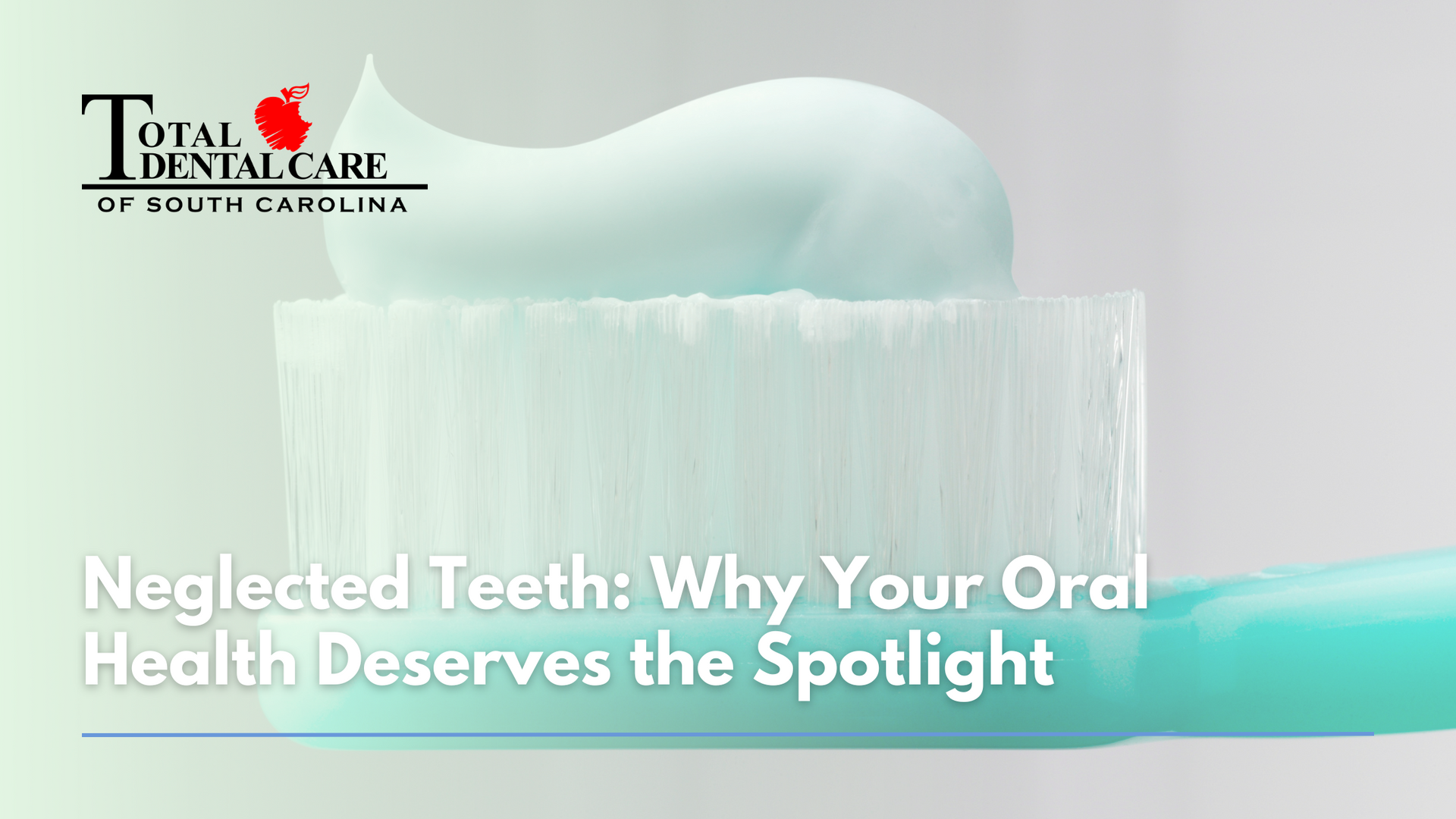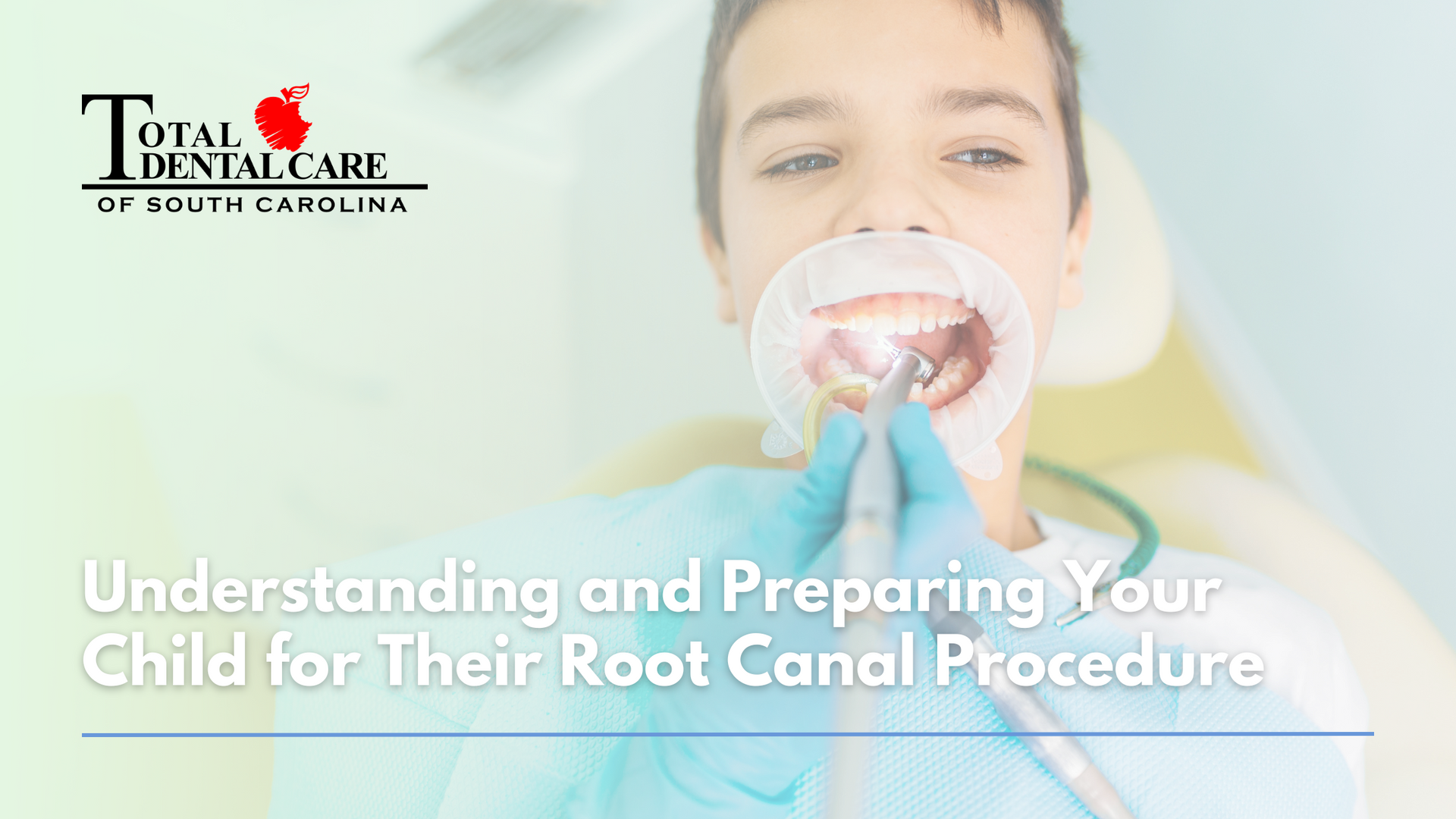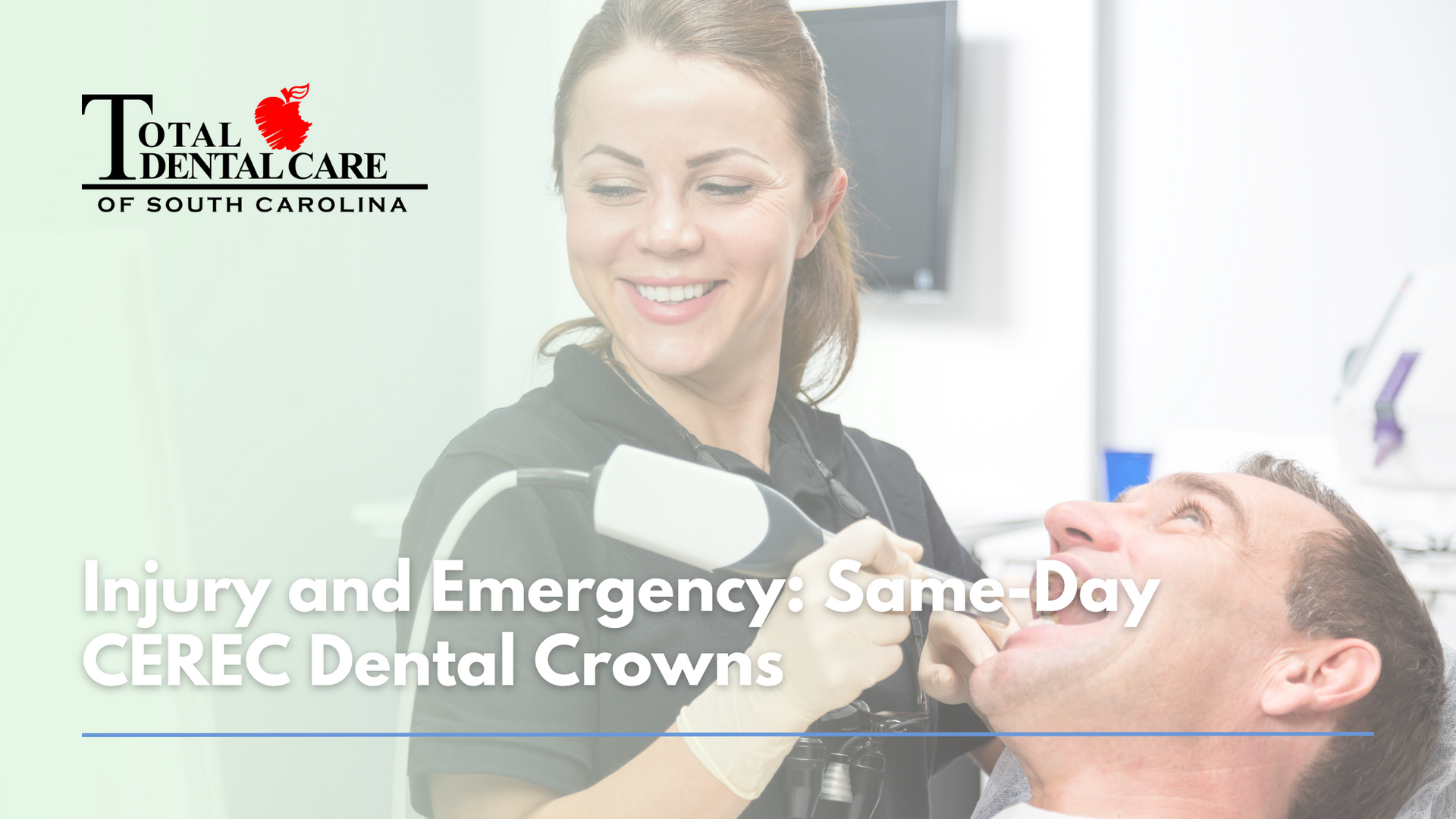Dental Emergency Treatment in South Carolina

Source: Dr. Marketing
Although discussing dental emergencies may not be enjoyable, it is essential to highlight the importance of promptly seeking advice when you encounter any oral discomfort. Tooth decay, gum disease, and chipped teeth are among the most frequent dental emergencies, but here we will also discuss other issues that may arise throughout your lifetime.
While maintaining good oral hygiene is key to preventing these issues, being prepared for emergencies can help minimize long-term effects. Familiarize yourself with common dental emergencies and learn how to respond effectively.
Our dental professionals are equipped to identify and address your specific issue. Neglecting the problem could lead to various health complications. Our team at Total Dental Care of South Carolina is ready to diagnose and help you recover, ensuring your well-being and a healthy lifestyle.
Common Dental Emergencies

These emergencies are typically categorized into three main groups: traumatic incidents, infections, and post-procedural complications. Here we will break down possible emergencies and tips to help you till your dental appointment.
TOOTH DECAY
Tooth decay is often the leading cause of dental emergencies. When the decay reaches the inner layer of the tooth (the dentin), it triggers sensitivity and the formation of a cavity, resulting in pain around the tooth.
Seeking dental treatment at this stage is important to save the tooth. Our dentists will evaluate the decay's extent and suggest the necessary treatment, which may involve a filling to restore the tooth's integrity. Ignoring a painful toothache is not advisable as untreated decay can lead to severe issues like infection or abscesses.
Book your appointment as soon as you can. Rinse your mouth with warm water to cleanse it. Carefully use dental floss to eliminate any food particles stuck between the teeth. Avoid placing aspirin on the aching tooth or gum tissues. Ibuprofen, aspirin, and acetaminophen are all known for their pain-relieving properties. However, a study indicates that ibuprofen is particularly effective for toothaches. Make sure to follow the recommended dosage on the medication's label.

CHIPPED OR CRACKED TOOTH
Sometimes our teeth break down over time for one reason or another. This could be due to injury or just regular wear.
In case of a cracked tooth, promptly rinse the mouth with warm water to cleanse the area. Apply cold compresses to the face to reduce swelling.
Just a reminder for athletes, we provide sports guards for athletic activities, as well as night guards for teeth grinding. If you need assistance with one, do not hesitate to contact our dental practice in Colombia, South Carolina. These guards are essential for minimizing wear and tear on your teeth while offering protection.
LOST FILLING/CROWN
Losing a filling or crown is usually not considered an urgent matter, but it can lead to discomfort as the exposed tooth tissue tends to be sensitive to temperature, pressure, or air. It can be surprising and unsettling to feel your filling or crown become loose due to constant chewing.
Dental fillings and crowns may dislodge for various reasons, such as consuming hard foods or simply due to the passage of time since they were placed. In some cases, tooth decay could also be a contributing factor.
If a filling falls out, this will be replaced at our dental practice. However, if a crown falls out, store it safely and bring it with you to your dental appointment with us. Once we see you, we can determine the next steps. Keep the area clean until your appointment with us.

DENTAL ABSCESS
A dental abscess is a bacterial infection. When an abscess forms at the tooth's end, it is known as a periapical abscess, and if it occurs in the gum, it is referred to as a periodontal abscess. The main symptom of a dental abscess is pain. This may be a throbbing pain and is often intense. The pain usually starts suddenly and becomes more intense over the following hours or days. In some cases, the pain may radiate to the ear, jawbone, and neck.
Symptoms of a dental abscess may include:
- Pain in the affected area while biting or touching it
- Puss from infection on the side of the gums
- Sensitivity to hot or cold food and drinks
- Unpleasant taste in the mouth
- Fever
- Feeling generally unwell
- Trouble opening the mouth
- Difficulty swallowing
- Insomnia
Dr. Forbes will remove the pus from the infected area. If a tooth problem has caused an abscess, root canal therapy may be required, or the tooth could be extracted. A local anesthetic will be administered to prevent any discomfort during the procedure.
Once the pus is removed and the infected area cleaned, the dentist will assess the extent of the damage. If root canal therapy is deemed necessary, the dentist will carefully remove the infected pulp, clean the inside of the tooth, and seal it to prevent further infection. In some cases, if the tooth is severely damaged and cannot be saved, extraction may be the best option to prevent the spread of infection to surrounding teeth.
Throughout the procedure, a local anesthetic will be used to ensure the patient remains comfortable and pain-free. It is important to follow post-operative care instructions provided by the dentist to promote healing and prevent any complications. Remember to maintain good oral hygiene practices to prevent future dental issues.
When dealing with abscessed teeth, our dentist may recommend an antibiotic to eliminate the infection. The time it takes for the antibiotics to alleviate the tooth infection (dental abscess) depends on the severity of the abscess. Typically, you may notice an improvement within 2-3 days, but some antibiotics can fully resolve the dental abscess in 10-14 days.
KNOCKED-OUT TOOTH/PARTIALLY DISLODGED TOOTH
An accident that has knocked out your tooth or partially dislodged it is a huge dental emergency. In hopes of saving the tooth, you must call us immediately at (803) 798-1670.
To preserve a knocked-out permanent or adult tooth, ensure it always stays moist. If possible, try reinserting it into the socket without touching the root. Alternatively, store it between your cheek and gums or in milk to preserve it till you reach our dental team. We will assist you at Total Dental Care of South Carolina in Colombia, South Carolina.

DRY SOCKET
A dry socket is a painful condition that can follow a tooth extraction. It occurs when the blood clot covering the wound is dislodged or fails to form properly. It can be quite uncomfortable, as it exposes the underlying nerves and bone to air, food, and fluids. If you suspect you may have a dry socket, it's important to contact your dentist for proper treatment. They may need to clean the socket, apply a medicated dressing, and provide pain relief to help you heal properly.
Remember to follow their instructions carefully and avoid smoking or using straws, as these can hinder the healing process. With proper care and attention, you can recover from a dry socket and get back to feeling like yourself again.
Typically, dry sockets resolve within a week. The most common symptom is worsening pain in the mouth and face two to three days after extraction. This pain can range from mild to severe. Other symptoms of dry socket may include extended pain in the head and neck, bad breath, and an unpleasant taste in the mouth.
SOFT TISSUE INJURY
Soft tissue injuries in the mouth typically do not result in excessive bleeding; however, the presence of blood mixed with saliva might give the impression of more bleeding than there is. To help with this kind of injury, start by rinsing out the mouth with a diluted saltwater solution.
Bleeding can typically be managed by applying damp gauze (or any clean material if gauze is unavailable) directly to the injury site and maintaining pressure for 10-15 minutes. If bleeding persists, seek prompt medical assistance.
It is advisable to visit our dentist for an assessment of the injury and necessary treatment. This may include assessing the injury severity, initial restorative procedures, and potential suturing. Additionally, an antibiotic may be necessary.
What Can Happen If I Don't See The Dentist During a Dental Emergency?

Unaddressed dental emergencies can result in intense pain, escalate to infections in deep spaces impacting nearby neck areas and facial sinuses, or potentially cause major health risks. Timely recognition and management of dental emergencies are essential in averting serious complications and offering relief.
It is crucial for healthcare providers to promptly recognize and manage dental emergencies. Without appropriate treatment, various dental emergencies can lead to serious illness and even death.
HOW CAN YOU PREVENT DENTAL EMERGENCIES
When dental emergencies occur, they are often unexpected. Accidents can happen beyond our control. However, there are measures we can take to avoid potential dental emergencies. Here are some to keep in mind to keep your oral health in check:
PREVENTIVE MEASURES
- Remember to brush your teeth twice daily with a soft-bristled toothbrush
- Ensure you are using the correct brushing technique
- Make flossing a regular part of your oral care routine
- Maintain a healthy diet for good oral health
- Stay away from sugary foods and drinks
- Schedule regular dental check-ups and cleanings
In addition to regular dental check-ups, opt for healthier alternatives like fruits, vegetables, and dairy products that are beneficial for your dental health. Drinking plenty of water throughout the day also helps in maintaining good oral hygiene by washing away food particles and bacteria.
Taking steps to care for your teeth not only prevents pain and discomfort but also promotes a confident smile and overall wellness. So, make your dental health a priority and enjoy a brighter, healthier smile for years to come.
WE ARE HERE TO HELP DURING YOUR DENTAL EMERGENCY

Dental emergencies are never pleasant, but life can bring us unexpected surprises. It is important to be prepared for such situations and know what to do when you need assistance. We hope this information helps you manage the issue until you can visit us.
Remember, if you experience a dental emergency, stay calm and assess the situation. Rinse your mouth with warm water and use dental floss to remove any food particles causing discomfort. If you have a toothache, you can apply a cold compress to the outside of your mouth to help with pain and swelling.
Contact us at Total Dental Care of South Carolina by calling (803) 798-1670 as soon as possible to schedule an appointment and receive proper care. Your oral health is important, and we are here to support you during these unexpected moments.
Total Dental Care of South Carolina is here to help your family in times of a dental emergency!
We are the local Columbia dentist near you!
Smile more and smile often.
Request A Dental Appointment
We look forward to seeing you soon!
Please note, we will try our best to accommodate your schedule.
Regarding insurance, we accept all PPO insurances, but are considered out-of-network for most plans. We are only in-network with Delta Dental. As a courtesy to all of our patients (in/out of network), we take care of the claim filing and processing. We do not currently accept patients on Medicare or Medicaid.
Thank you so much for contacting our dental practice. While we strive to respond to all inquiries right away, we may be away from the desk helping a patient or out of the office. We will do our best to reach back to you shortly.
Please note, if this is a dental emergency, it would be best to call our practice as this is the fastest way to reach us (803) 798-1670.
Please try again later
Columbia Dentist
We understand that trying to find a nearby dentist you can trust is difficult, that is why we make it easy for you to work with us.
(803) 798-1670
1061 St Andrews Rd, Columbia
info@getabettersmile.com
Helpful Links
Dental Practice Hours
- Monday
- -
- Tuesday
- -
- Wednesday
- -
- Thursday
- -
- Friday
- Appointment Only
- Saturday
- Closed
- Sunday
- Closed
All Rights Reserved | Total Dental Care of South Carolina
All Rights Reserved | Total Dental Care of South Carolina
Dentist Website Diagnosed, Treated, and Cured by Dr. Marketing Inc



